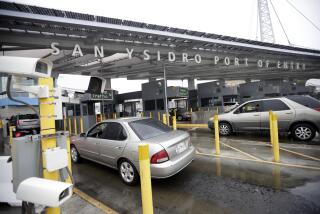U.S. Official Convicted in Smuggling of Reptiles
- Share via
The first U.S. Fish and Wildlife Service inspector ever convicted of corruption was sentenced Friday to a year in prison and 2,000 hours of community service for illegally importing more than 50,000 exotic reptiles from Colombia.
Daniel Gus Noether, a 10-year wildlife service employee, was accused of accepting more than $30,000 in bribes for approving the illegal shipments, which involved crocodiles, boa constrictors, mud turtles and other reptiles protected by international treaties.
“This was a man who used his Fish and Wildlife Service position as his own personal fiefdom, for his own personal profit,” said Assistant U.S. Atty. Maurice A. Leiter, who prosecuted the case.
Noether, 39, of Lakewood, told U.S. District Judge Mariana R. Pfaelzer that he received only about $4,000 from an old friend and wildlife importer, Danny Leroy Blue, and that Blue had enticed him into the scheme.
‘I Just Did It’
“I did it partly for the money and partly because I felt sorry for Dan, but mostly I just did it,” he said in a letter to the court. “It’s as if I was at a theater sitting in the audience watching a movie, and the main character on the screen was me.”
But Government prosecutors introduced secretly recorded conversations in which Noether discusses his earnings with Blue, which he claims total $30,000 to $45,000.
“No way they’re going to prove I took any money, cause you never gave me a check . . .(only) cash,” he said on tape.
At one point, when he began to suspect he was under investigation, he told Blue: “I’ve changed my mind about getting popped this year, ‘cause I mean, if you got caught, well, it’d be one thing, but now I know they suspect me . . . it’d be like, let’s make a (expletive deleted) example for the rest of the inspectors.”
Leiter said the animals involved are not as rare as endangered species but are nonetheless scarce enough that their commercial export out of Colombia is prohibited.
Resold as Pets
Once they arrived in the United States, he said, some were resold as pets, and others, especially the caimans, were resold to Taiwanese merchants for use in the fashion industry.
But Noether’s attorney, David R. Evans, scoffed at the idea that the animals are rare and said that Colombia in most cases bans export of the live animals because it can collect a fee on the animals’ skins. Colombia is now exporting 300,000 to 1 million caiman skins a year, Evans said.
He said Noether plans to serve his community service hours working for the Wildlife Waystation, a San Fernando Valley charitable group that shelters exotic and native wildlife.
More to Read
Sign up for Essential California
The most important California stories and recommendations in your inbox every morning.
You may occasionally receive promotional content from the Los Angeles Times.










